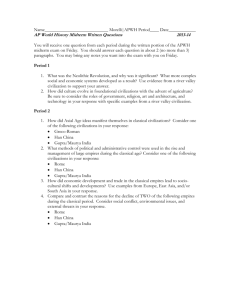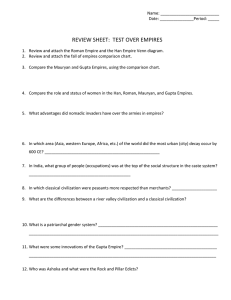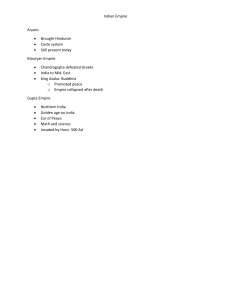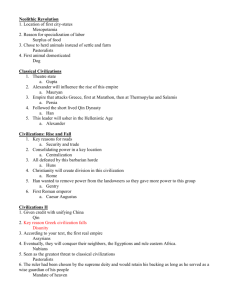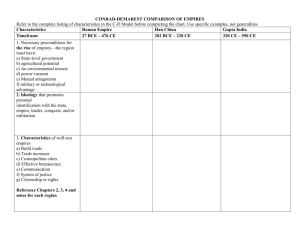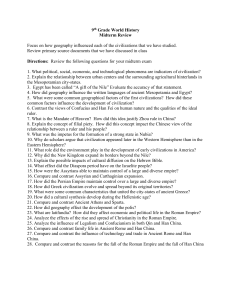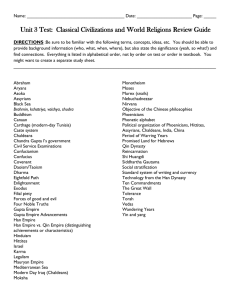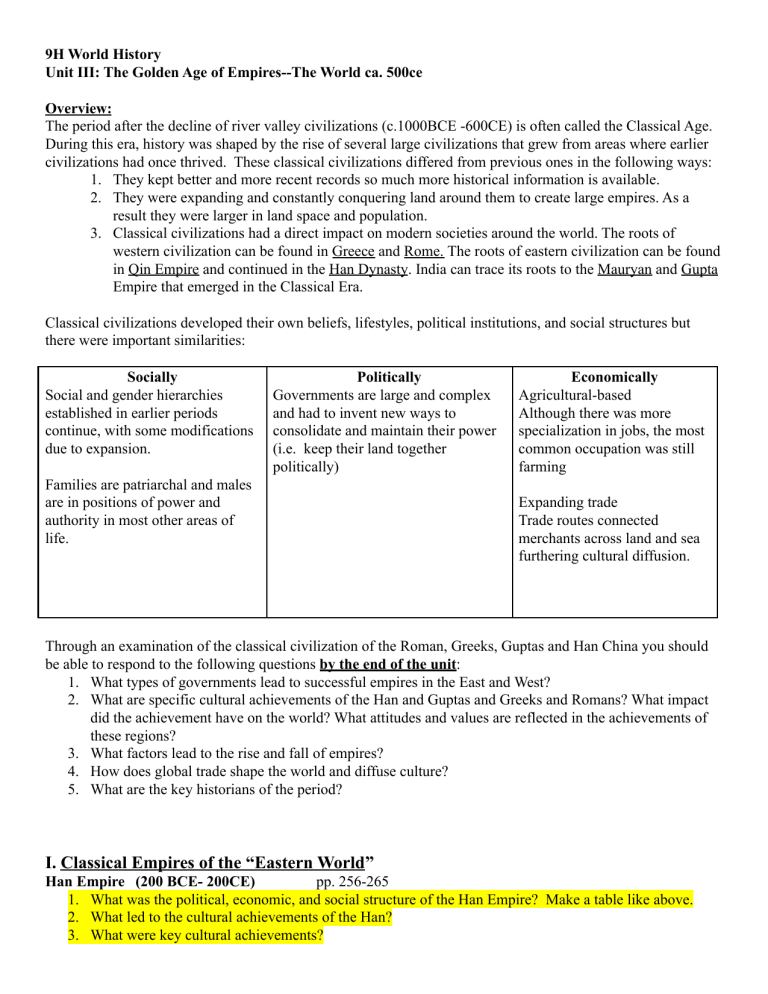
9H World History Unit III: The Golden Age of Empires--The World ca. 500ce Overview: The period after the decline of river valley civilizations (c.1000BCE -600CE) is often called the Classical Age. During this era, history was shaped by the rise of several large civilizations that grew from areas where earlier civilizations had once thrived. These classical civilizations differed from previous ones in the following ways: 1. They kept better and more recent records so much more historical information is available. 2. They were expanding and constantly conquering land around them to create large empires. As a result they were larger in land space and population. 3. Classical civilizations had a direct impact on modern societies around the world. The roots of western civilization can be found in Greece and Rome. The roots of eastern civilization can be found in Qin Empire and continued in the Han Dynasty. India can trace its roots to the Mauryan and Gupta Empire that emerged in the Classical Era. Classical civilizations developed their own beliefs, lifestyles, political institutions, and social structures but there were important similarities: Socially Social and gender hierarchies established in earlier periods continue, with some modifications due to expansion. Politically Governments are large and complex and had to invent new ways to consolidate and maintain their power (i.e. keep their land together politically) Families are patriarchal and males are in positions of power and authority in most other areas of life. Economically Agricultural-based Although there was more specialization in jobs, the most common occupation was still farming Expanding trade Trade routes connected merchants across land and sea furthering cultural diffusion. Through an examination of the classical civilization of the Roman, Greeks, Guptas and Han China you should be able to respond to the following questions by the end of the unit: 1. What types of governments lead to successful empires in the East and West? 2. What are specific cultural achievements of the Han and Guptas and Greeks and Romans? What impact did the achievement have on the world? What attitudes and values are reflected in the achievements of these regions? 3. What factors lead to the rise and fall of empires? 4. How does global trade shape the world and diffuse culture? 5. What are the key historians of the period? I. Classical Empires of the “Eastern World” Han Empire (200 BCE- 200CE) pp. 256-265 1. What was the political, economic, and social structure of the Han Empire? Make a table like above. 2. What led to the cultural achievements of the Han? 3. What were key cultural achievements? 4. 5. 6. 7. 8. 9. What role did technology play in strengthening the Han Empire? What was the silk road and why was it important? What was life like in the Han Dynasty? Why did the Han decline and fall? What were key religious developments? How did Confucianism influence the Han? Key Terms: Shi Huangdi Han Golden Age Monopoly Feudalism Classical Civilization Warring States Great Wall Liu Bang Wudi commerce acupuncture Faxian Ban Zhao Zhou Dissent Centralization Civil Service Exam Silk-making Papermaking Silk Road Mauryan (321 to c.180BCE) & Gupta Empires (320-550 CE) in India pp. 242-253 10. Who is Asoka and what did he accomplish? 11. In what ways did the Mauryan Empire provide the basis of the Gupta Empire? 12. What challenges had to be overcome to create unity in India 13. Why is Chandra Gupta II rule considered the “highwater mark” of the Gupta Empire? 14. What was the political, economic, and social structure of the Gupta Empire? Make a table like above. 15. Would you have liked to live there? Why or Why not? 16. How did monsoons affect Indian life? 17. What are key religious developments? 18. What were the key cultural developments? 19. Where was Indian trade focused on? 20. What were the effects of Indian trade? Key Terms: Chandragupta Deccan Megasthenes Asoka Buddhism Hinduism Stupas Dravidians matriarchal Faxian Rajahs Kalidasa White Huns Ajanta Sanskrit Indian Ocean trade Monsoons patriarchal II. Classical Empires of the “Western World” The Greeks (750BCE - 133 BCE) pp. 148-175 1. What were the geographic conditions of the land that the Greeks occupied? 2. Who are the Minoans and the Mycenaeans and what is their connection with the Greeks? 3. How are the two great epic poems of the Iliad and the Odyssey great historical sources? 4. Why did the Greeks not create a large empire? 5. What kinds of governments did the Greek city-states develop? 6. How does Greece establish the core values of Western Civilization? 7. What was the Greek (specifically the Athenian) attitude toward education? 8. What institution did Spartan society revolve around? 9. What role did religion play in Greek life? 10. What impact did the attack from Persia have on the Greek city-States? 11. What is the legacy of Alexander the Great? 12. How does Athenian culture stress the importance of the individual? Key Terms: Polis Acropolis Monarchy Aristocracy Oligarchy Phalanx Helot Democracy vs. Limited Democracy Tyrant Legislature Herodotus Delian League Pericles Philosophy Logic Rhetoric Socrates Plato Aristotle Comedy/ Tragedy Alexander The Great Hippocrates Hellenism Macedonia Stoicism Rome (509 BCE – 476 CE) pp. 208-238 13. How did Rome’s geography differ from Greece’s 14. What were the major characteristics of government and society in the Roma Republic? 15. How did the Romans win an empire? 16. How was stability in the empire promoted? 17. What were the underlying social and economic problems hiding during the Pax Romana? 18. What did the Romans borrow from the Greeks and what was uniquely Roman? 19. What was Rome’s role in the international trade network? Did their role offer them an advantage or disadvantage? 20. What were the common principles of Roman law? 21. What were the religious, social and political conditions that gave rise to Christianity? Republic Dictator Plebeian Patrician “Bread and Circuses” Aqueduct Legion Citizen Laws of the Twelve Tables Hannibal Latifundia Imperialism Julius Caesar “Veni, vidi, vici” Edict of Milan Augustus Heresies Pax Romana Diocletian Virgil Constantine Greco-Roman Civilization Paul
